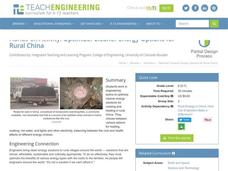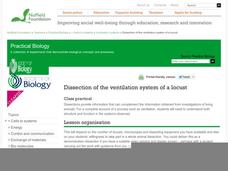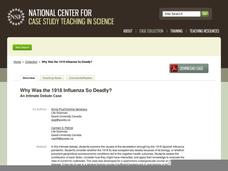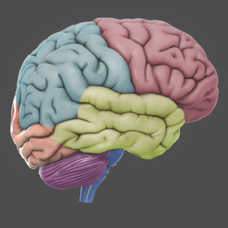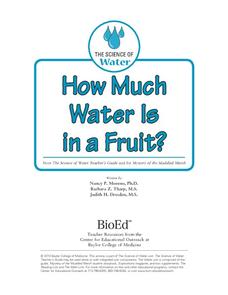Curated OER
All You Need to Know about Horses
Whether you're teaching a group of equestrians, a 4-H club, or an agricultural science class, you'll need to cover basic horse terminology. Horse care, breeds, anatomy, and markings are defined and exemplified through full color...
Curated OER
Genetics PowerPoint
If mom is bald, will her babies be bald? Here is a practical presentation that can answer that question. Viewers can take notes on the difference between dominant and recessive genes, mutations, and heritability. A large portion of the...
Teach Engineering
Optimize! Cleaner Energy Options for Rural China
What are the trade-offs when looking to get the most benefit from an energy source? Small groups compare the cost-to-emission levels of several energy sources by looking at the information graphically. The groups utilize this information...
May Media Group
Treatment Plants
Young scientists explore nature's water treatment plants in this simple science demonstration. By placing a stalk of celery in a cup of water mixed with food coloring, children are able to observe how plants absorb nutrients and...
World Wildlife Fund
WWF Together
Animal lovers will enjoy this award-winning picturesque app which educates children and adults about the threats of endangered species.
Curated OER
A Simple Model for Natural Selection
Do you have what it takes to survive as a fit predator or will elusive prey lead to your extinction? Find out in a creative natural selection activity. Using different colors and shapes of grains to represent different species and...
Curated OER
Hazards of Defrosted Food
Peas spoilage hot, peas spoilage cold: examine the bacterial growth on newly defrosted peas versus peas that have been defrosted for 24 hours. Using the session one questions in the "Microbes and Food Spoilage" PDF, learners will make...
Pulitzer Center
Extractive Industries
Here is a chance for environmental studies classes to take a critical look at crises occurring around the globe by reading articles and viewing video clips. The human activities under scrutiny are the extraction of oil, logging, and...
Curated OER
Elastic Recoil in Arteries and Veins
A lab in which high schoolers examine the difference between arteries and veins. Budding biologists will find out which blood vessel can stretch furthest, recording their data in a table then answering several questions evaluating their...
Nuffield Foundation
Dissection of the Ventilation System of a Locust
Jiminy cricket! If you find yourself plagued by fear of dissection, these locust respiratory system dissection directions will walk you through everything you need to know. Teens inspect a living locust to begin with, then jump over to...
National Center for Case Study Teaching in Science
Why Was the 1918 Influenza So Deadly?
Which factor was more influential in the 1918 flu epidemic: biology, or social and political conditions? Your AP biology class will research and debate one of these positions in an interesting and challenging instructional activity....
National Center for Case Study Teaching in Science
Bad Blood
When it comes to science and medicine, ethics should always be a primary consideration; unfortunately, that has not always been the case. There are countless examples throughout history of questionable medical practices, marginalized...
Cold Spring Harbor Laboratory
3D Brain
Imagine being able to rotate the brain and view interior structures without dissection! This tool allows anatomy masters to do just that. They also learn about the associated functions, disorders, and symptoms of damage to each structure.
Polar Trec
Animal Monitoring Introduction
Not only do mealworms taste great, they are also great for classroom science lessons. In pairs, young scientists observe and record what they see as they check out what their mealworms are doing from minute to minute. Each minute...
Baylor College
Do Plants Need Light?
Turn your classroom into a greenhouse with a lesson on plant growth. First, investigate the different parts of seeds, identifying the seed coat, cotyledon, and embryo. Then plant the seeds and watch them grow! Measure the new plants...
Baylor College
Microbes and Disease
Discuss how diseases have impacted human history. Divide your class into groups and assign each group one of the following: tuberculosis, malaria, plague, cholera, smallpox, and AIDS. They read up on, complete a concept map, and present...
Baylor College
Pre-Assessment: Earth's Energy Sources
A ten-question, multiple-choice quiz assesses what your elementary earth scientists know about the atmosphere both before and after a unique unit on global atmospheric change. Make sure to check out the activities and lesson plans...
Baylor College
Post-Assessment: Brain Chemistry
If you have implemented this fabulous brain chemistry unit in its entirety, you should have saved the pre-assessment quizzes from day one. In this assignment, individual learners go back over their original answers, and correct any...
Baylor College
Post-Assessment: Global Atmospheric Change
Find out how much your earth scientists learned about the atmosphere in the unit on global atmospheric change with this assessment. After writing a letter to persuade others to make changes to protect our atmosphere, pupils take the same...
Baylor College
Why Is Water Important? Pre-assessment
This water worksheet is just the tip of the iceberg! It a multiple-choice quiz meant to be a pre-assessment for a wonderful water unit. There are 10 questions to be answered regarding the role, properties, and behavior of water. Make...
Baylor College
How Much Water Is in a Fruit?
Compare the volume of an orange to the volume of liquid that can be extracted out of it. Also compare the mass of an apple before and after it has been dried out. In both of these activities, children find that there is an appreciable...
Baylor College
How Much Water Do Humans Need?
Physical or life science learners measure the amounts of water eliminated by intestines and the urinary system, and the amounts lost via respiration and perspiration. In doing so, they discover that the body's water must be replenished...
Baylor College
What's Is Soil Made Of?
It's time to roll up those sleeves and get a little dirty in the second lesson of this series on the science of food. Investigate where plants and animals get the minerals they need to live in this two-part exploration of soil. First,...
Baylor College
Plant Parts You Eat
Plants provide a variety of delicious foods essential for human survival. In the fourth lesson of this series on food science, young scientists investigate common fruits, vegetables, and grains in order to determine which plant part is...
Other popular searches
- Health Nutrition and Sports
- Mental Health
- Family Health
- Public Health
- Healthy Eating
- Health Education
- Womens Health
- Childrens Health
- Healthy Relationships
- World Health
- Emotional Health
- Children's Health




